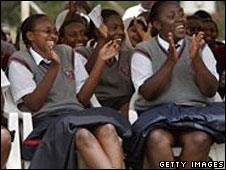UK aid for foreign schools 'gets disappointing results'
- Published

Standards of literacy and maths have shown little improvement
The amount of UK aid spent on education in the developing world has had a disappointing impact, a report from the National Audit Office says.
The number of children taught, particularly in Africa, has increased but the quality of education is poor.
The £800m spent on education is due to reach at least £1bn in 2010-11.
The government said education was still a priority, but it would now concentrate on results, not just the amount of money spent.
Some of the Department for International Development (DFID) funding removed fees for education in Africa, which caused the proportion of children attending classes to rise dramatically.
Teacher absenteeism
But the report said the quality of the education they received was disappointing and many pupils dropped out. One in five Ethiopian children left school within the first year and a large number needed to repeat classes.
And despite the increased spending, the standards of literacy and maths have shown little improvement.
Part of the problem is that teachers are repeatedly absent from school. Students in Ghana, for example, are on average taught for just 76 days out of the 197 days in the school year.
The report also said 14 of DFID's 22 priority countries were on track to achieve its enrolment goal by 2015.
It also said progress on achieving equal numbers of boys and girls enrolled had been good, with eight countries already having achieved the goal.
Amyas Morse, head of the National Audit Office, said more emphasis needed to be placed on quality, attainment and cost-effectiveness.
"DFID needs to do more and to take a tougher, clearer stance on the importance of cost and service performance information, and in particular indicators of education delivery and attainment if it is to make sure its contributions achieve the maximum good effect," he said.
International Development Secretary Andrew Mitchell said: "Education is a basic human right and a very good investment in the future.
"This report shows that progress is being made but also why this government is right to focus on results - concentrating on outputs and outcomes, not just inputs. Value for money, transparency and effectiveness remain my top priorities."
The NAO report looked in detail at the government's work in Ghana, Kenya, Ethiopia and India, where it has major education programmes.